新概念英语第二册第9课习题答案
(完整版)新概念英语第二册第九课课后习题答案详解
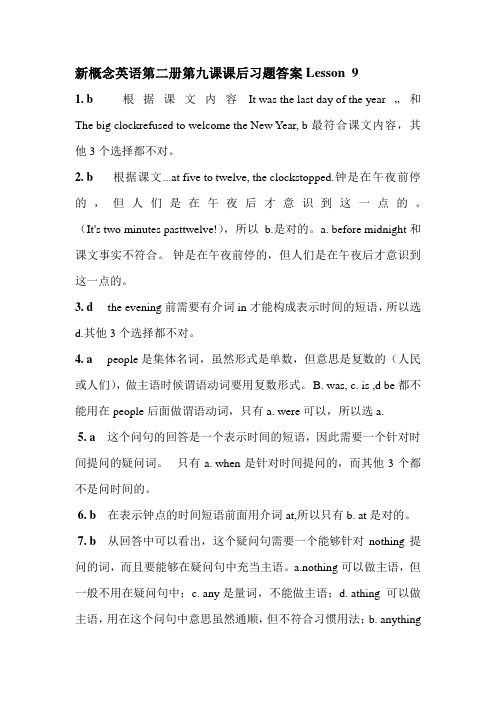
新概念英语第二册第九课课后习题答案Lesson 91. b 根据课文内容 It was the last day of the year…和The big clockrefused to welcome the New Year, b 最符合课文内容,其他3个选择都不对。
2. b根据课文...at five to twelve, the clockstopped.钟是在午夜前停的,但人们是在午夜后才意识到这一点的。
(It's two minutes pasttwelve!),所以 b.是对的。
a. before midnight 和课文事实不符合。
钟是在午夜前停的,但人们是在午夜后才意识到这一点的。
3. d the evening 前需要有介词in才能构成表示时间的短语,所以选d.其他3个选择都不对。
4. a people 是集体名词,虽然形式是单数,但意思是复数的(人民或人们),做主语时候谓语动词要用复数形式。
B. was, c. is ,d be 都不能用在people 后面做谓语动词,只有a. were 可以,所以选a.5. a 这个问句的回答是一个表示时间的短语,因此需要一个针对时间提问的疑问词。
只有a. when是针对时间提问的,而其他3个都不是问时间的。
6. b在表示钟点的时间短语前面用介词at,所以只有b. at 是对的。
7. b从回答中可以看出,这个疑问句需要一个能够针对nothing提问的词,而且要能够在疑问句中充当主语。
a.nothing可以做主语,但一般不用在疑问句中;c. any 是量词,不能做主语;d. athing可以做主语,用在这个问句中意思虽然通顺,但不符合习惯用法;b. anything是不定代词,可以做主语,而且只能在疑问句中做主语,所以b.是对的。
8. d a. hit , b. beat, c. knock , d. strike这几个动词中都有“敲”,“打”,“击”的意思,但是只有strike 有“(钟表)敲鸣”,“报时”的含义,所以最佳选择是d.9. b 本句表示钟点的短"几点过几分"中只能用介词past,所以只有b. past 是正确的答案。
新概念英语第二册第九课课文
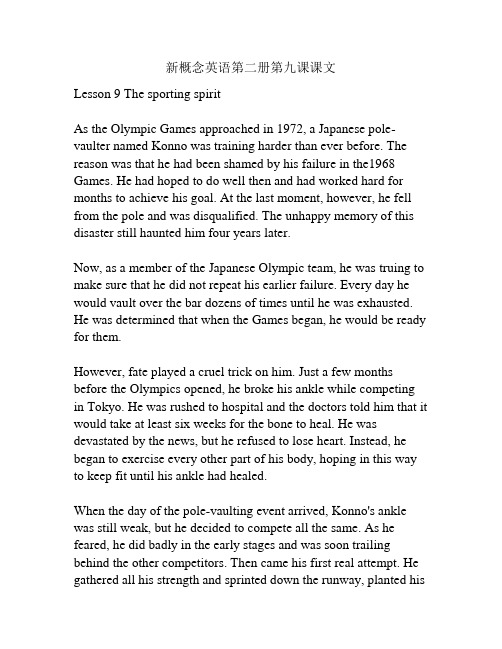
新概念英语第二册第九课课文Lesson 9 The sporting spiritAs the Olympic Games approached in 1972, a Japanese pole-vaulter named Konno was training harder than ever before. The reason was that he had been shamed by his failure in the1968 Games. He had hoped to do well then and had worked hard for months to achieve his goal. At the last moment, however, he fell from the pole and was disqualified. The unhappy memory of this disaster still haunted him four years later.Now, as a member of the Japanese Olympic team, he was truing to make sure that he did not repeat his earlier failure. Every day he would vault over the bar dozens of times until he was exhausted. He was determined that when the Games began, he would be ready for them.However, fate played a cruel trick on him. Just a few months before the Olympics opened, he broke his ankle while competing in Tokyo. He was rushed to hospital and the doctors told him that it would take at least six weeks for the bone to heal. He was devastated by the news, but he refused to lose heart. Instead, he began to exercise every other part of his body, hoping in this way to keep fit until his ankle had healed.When the day of the pole-vaulting event arrived, Konno's ankle was still weak, but he decided to compete all the same. As he feared, he did badly in the early stages and was soon trailing behind the other competitors. Then came his first real attempt. He gathered all his strength and sprinted down the runway, planted hispole firmly in the ground and hurled himself into the air. For a heart-stopping moment, he seemed to be failing again, but somehow he managed to twist his body so that he fell across the bar without knocking it off. The crowd cheered wildly as the judges signalled that the jump was successful.Konno was encouraged by his success and went on to make two other jumps, each one slightly better than the last. When the competition ended, he found to his amazement that he had won a bronze medal. It was not the gold medal he had hoped for, but it was still an achievement of which he could be proud.The story of Konno teaches us an important lesson about sport. It is not enough merely to possess great physical ability. To be a true sportsman one must also have courage, determination and, above all, the sporting spirit. The true sportsman does not lose heart when he is defeated. He picks himself up and tries again, even if he is handicapped by injury or illness. He strives to do his best under all circumstances, never forgetting that it is not winning but taking part that counts. This is the sporting spirit, and it is the noblest of all human qualities.。
新概念英语第二册第9课Lesson9-A-cold-welcome
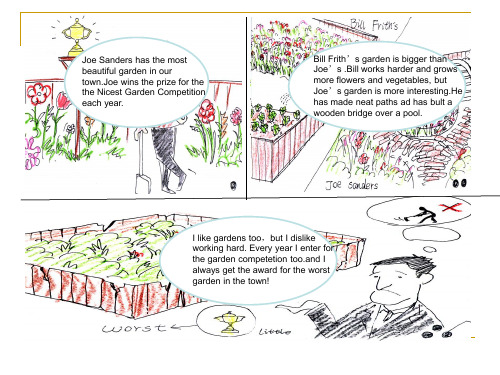
twelve, the clock stopped. The big minute
hand did not move.
Read together or one by one
• We waited and waited, but nothing happened.
• Suddenly someone shouted, “It's two minutes past twelve. The clock has stopped!”
引导时间壮语的介词:in /on /at/during/till &until
➢in:
1. 表示一天当中的某一段时间 e.g.:in the morning/ afternoon/ evening 2. 表示月份、年份: e.g.: in March/ September/ 2008 3. 表示季节: e.g.: in spring/ winter 4. 表示“在某段时间之内” e.g.: I always eat my breakfast in ten minutes. 5. 表示“…时间之后”, 与将来时连用 e.g.: The teacher will be arrive in ten days.
crowd of peo突p然le意识h到a,d突然g出a现thered under the Town
A rather worrying thought struck me.
Hall clock.
• It would strike twelve in twenty minutes’ time.
• Fifteen minutes passed and then at five to
Grammar Time
新概念英语第二册课后答案
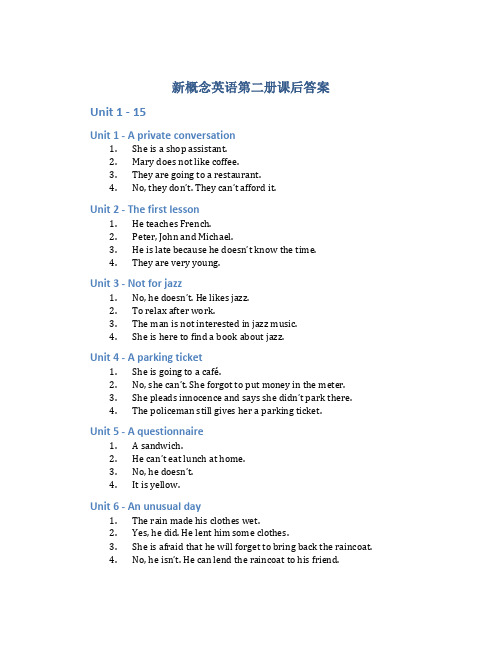
新概念英语第二册课后答案Unit 1 - 15Unit 1 - A private conversation1.She is a shop assistant.2.Mary does not like coffee.3.They are going to a restaurant.4.No, they don’t. They can’t afford it.Unit 2 - The first lesson1.He teaches French.2.Peter, John and Michael.3.He is late because he doesn’t know the time.4.They are very young.Unit 3 - Not for jazz1.No, he doesn’t. He likes jazz.2.To relax after work.3.The man is not interested in jazz music.4.She is here to find a book about jazz.Unit 4 - A parking ticket1.She is going to a café.2.No, she can’t. She forgot to put money in the meter.3.She pleads innocence and says she didn’t park there.4.The policeman still gives her a parking ticket.Unit 5 - A questionnaire1. A sandwich.2.He can’t eat lunch at home.3.No, he doesn’t.4.It is yellow.Unit 6 - An unusual day1.The rain made his clothes wet.2.Yes, he did. He lent him some clothes.3.She is afraid that he will forget to bring back the raincoat.4.No, he isn’t. He can lend the raincoat to his friend.Unit 7 - Is that you, John?1.He d oesn’t think it is John’s voice.2.He has lost his wallet on the train.3.No, he didn’t. He found £20.4.He should return the money.Unit 8 - A coffee break1.No, she doesn’t drink coffee.2.She wants to buy some milk.3.No, he doesn’t. He is going to buy some lemon t ea.4.The tea costs £1.80.Unit 9 - A matter of seconds1.In a library.2.She asked the man to return the book to the library.3.No, she doesn’t have enough money to pay the fine.4.She gets a letter from the library.Unit 10 - When were you born?1.He was born on May 5th, 1965.2.His father was born in 1935.3.Yes, he does. He is a schoolteacher.4.He is very tired.Unit 11 - The best and the worst1.In Rome and Paris.2.Rome was the most interesting place he visited.3.The weather in India was the worst.4.He doesn’t know. He hasn’t been to Switzerland. Unit 12 - New Zealand1.It is a small country in the South Pacific.2.There are three main islands.3.The capital city is Wellington.4.The people there are friendly.Unit 13 - Work and play1.He is a teacher.2.Teacher to students.3.He can’t stay with his friends because he has to work.4.He can’t. He has work to do.Unit 14 - A museum for everyone1.Yes, it does.2.They can touch everything in the museum.3.Yes, they have. They enjoyed their visit very much.4.They don’t have to pay any money.Unit 15 - Paying the bill1.They had lunch at a restaurant.2.They pay first and then have lunch.3.They forget to bring any money.4.They invite the man to have some coffee.ConclusionThe above answers are provided for the exercises in the New Concept English Book 2. Go through the questions and compare your answers with the suggested responses to check for correctness. Practicing and reviewing these exercises will help enhance your understanding of the course material and improve your English language skills.。
新概念英语第二册课后习题答案详解_1-10
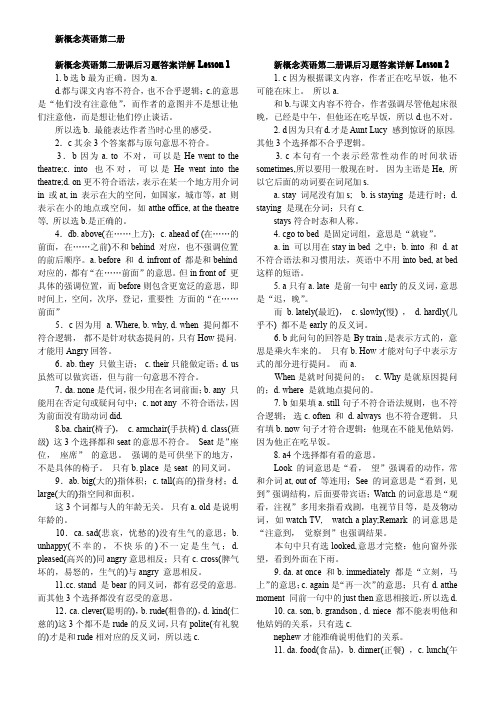
新概念英语第二册新概念英语第二册课后习题答案详解Lesson11.b选b最为正确。
因为a.d.都与课文内容不符合,也不合乎逻辑;c.的意思是“他们没有注意他”,而作者的意图并不是想让他们注意他,而是想让他们停止谈话。
所以选b.最能表达作者当时心里的感受。
2.c其余3个答案都与原句意思不符合。
3.b因为a.to不对,可以是He went to the theatre;c.into也不对,可以是He went into the theatre;d.on更不符合语法,表示在某一个地方用介词in或at,in表示在大的空间,如国家,城市等,at则表示在小的地点或空间,如atthe office,at the theatre 等,所以选b.是正确的。
4.db.above(在……上方);c.ahead of(在……的前面,在……之前)不和behind对应,也不强调位置的前后顺序。
a.before和 d.infront of都是和behind 对应的,都有“在……前面”的意思。
但in front of更具体的强调位置,而before则包含更宽泛的意思,即时间上,空间,次序,登记,重要性方面的“在……前面”5.c因为用 a.Where,b.why,d.when提问都不符合逻辑,都不是针对状态提问的,只有How提问,才能用Angry回答。
6.ab.they只做主语;c.their只能做定语; 虽然可以做宾语,但与前一句意思不符合。
7.da.none是代词,很少用在名词前面;b.any只能用在否定句或疑问句中;c.not any不符合语法,因为前面没有助动词did.8.ba.chair(椅子),c.armchair(手扶椅)d.class(班级)这3个选择都和seat的意思不符合。
Seat是”座位,座席”的意思。
强调的是可供坐下的地方,不是具体的椅子。
只有b.place是seat的同义词。
9.ab.big(大的)指体积;c.tall(高的)指身材;d. large(大的)指空间和面积。
新概念英语第二册_1-9课测试题(答案版)

New Concept English Book Ⅱ一、单项选择一、单项选择 1. the teacher at this college last year ? Yes, he did. A. Did, taught B. does, teach C. Did, teach D Do,teach 2、I went to the supermarket and bought a great many A.tomatoes B.potatos C.vegetables D.meat 3、He until it stopped raining. A.waited B. didn't wait C. didn ’t leave D.left 4、For the whole period of two months, there no rain in this area. A.is B.will be C.has been D.have been 5、——Hey, how are you getting with your girlfriend? ————A .I t’s none of your business! It’s none of your business! B.Dear me! C .Take it easy. D.Enjoy yourself. 6、A great number of students fond of films, but a good student seldom to the cinema A. are,goes B. is,goes C. are,go D. is,go 7、If their house not like ours, what it look like? A.is, is B.is, does C.does, does D.does, is 8. I’m _______ in that ________ filmA. interesting, interested B. interested, interesting C. interested, interested D. interesting, interesting 9. ------ Hurry up! We have little time! ------ I ____________. A. will come B. come C. shall come D. am coming 10. -------_____________? -------I am Italian. A. What’s your job B. What’s your name C. What nationality are you D.Where do you from 1111. I don’t have ______writing paper, I only have _____chalk . I don’t have ______writing paper, I only have _____chalks. A. any, any B. any, some C. some, some D.some,any 12. Look, the little dog ______after a big cat! A. runs B. is running C. is going to run D.is runing 1313. It’s very cold. _______ your coat. . It’s very cold. _______ your coat. A. Take off B. Put on C. Turn on D.Put off 14.The man could not bear it.He could not it. A.carry B.suffer C.stand D.lift 15.Just then,the telephone rang.It rang . A.at once B.immediately C.again D.at that moment 16.On the last day he made a big dicision.It was the day of his holiday. A.final B.end test D.bottom 17.He calls at every house in the street.He everyone. A.shouts at B.calls C.cries out at D.visits 18.The detectives were a valuable parcel of diamonds. A.expecting B.waiting C.expecting for D.expecting to 19.The man is fond of gardens. . A.They like him B.They like to him C.He likes them D.He likes they 20.How many times did the clock . A.hit B.beat C.knock D.strike 二、用一般过去和过去进行时填空. 21. I (fall) when I (skate). 22. While Tome and Jerry (eat), they (hear) a strane noise. 23. Julie (see) something weird when she (walk) in the park. 24. Mr. White (walk) in the street when it (start) to rain. 25. When David (come) home, John (make) dinner. 三、用三、用 over, between, along, in front of, behind, 或 across 等介词或介词短语填空等介词或介词短语填空26. A lot of birds are flying _______ the river. 27. The teacher is standing ___________ the blackboard. 28. I am running _______ the Great Wall(长城). 29. They are swimming _____ the river. 30. I am sitting ________my brother and my sister. 四、用所给单词的适当形式填空:四、用所给单词的适当形式填空:31、He is not very (friend) towards newcomers(新来的). 32、She slammed the telephone down (angry). 33、It was a sudden (decide) 34、She works for that restaurant as a (waiter) 35、She is very (exciting) about winning the first prize. 36、What have you been done (late). 37、We are very (please) with our new house. 38、She ( rare) visited her aunt. 39、“What do you want ?”She asked (rude) 40、I had a long (converse) with her the other day (不久前一天). 五、词组互译五、词组互译41、none of your business 42、和某人谈话、和某人谈话43、在回家的路上、在回家的路上44、by the way 45、注意、注意六、阅读理解六、阅读理解How How many many many different different different languages languages languages are are are spoken spoken spoken in in in the the the world world world today? today? today? There There There are are are about about about 5,000 5,000 5,000 different different languages. Nearly 900 languages are spoken in India .Chinese is the language spoken by the biggest number of people in the world .But the most widely spoken language in the world is English .300,000,000 people speak English as a first language .Nearly twice as many--about 650 million people speak it as a foreign language .How many words are there in the English language? There are about 490,000.Also ,there are about 300,000 words used in science(科技).There are more words in English than in any other language .But most people use no more than 60,000 words .Children ,leaving school at the age of 1 6,know about 1 5,000 words .1.The Chinese language is spoken ________. A.in most countries in the world B.in 600 countries C.by the biggest number of people in the world 2.About 650 million people speak English as________.A.a first language B.well as the native speakers C.a second language 3.Only ________ English words are used by most people .A.six thousand B.three hundred thousand C.sixty thousand 4.Children ________ know about 15,000 words .A.who start school at the age of 6 B.who study at school C.who finish school at sixteen 5.5.Which of the following is true’Which of the following is true’A.There are no more than 5,000 different languages in the world .B.English is the most widely-used language .C.The Indian people speak 800 languages .One day a poor student was walking through a town. He had not had anything to eat for several days and he was very hungry. And when he saw a man selling homemade hamburgers, he let out a scream and fell to the ground. When the surprised seller asked the student what the matter was, the student answered, “I don’t like hamburgers. In fact, I hate them. Whenever I see them, I feel ill and can’t eat.”The The hamburger hamburger hamburger seller seller seller then then then thought thought thought that that that he he he would would would play play play a a a joke joke joke on on on the the the student. student. student. He He He put put put ten ten hamburgers hamburgers in in in the the the comer comer comer of of of a a a room room room and and and then then then locked locked locked the the the student student student in in in it. it. it. After After After a a a short short short time, time, time, the the hamburger seller opened the door of the room. He was surprised to find that the student had eaten all all the the the hamburgers. hamburgers. hamburgers. The The The student student student explained. explained. explained. “For “For “For some some some strange strange strange reason, reason, reason, I I I suddenly suddenly suddenly decided decided decided that that that I I liked hamburgers.”The hamburger seller was angry that the student had fooled him. He asked what other things he he did did did not not not like like like to to to eat. eat. eat. “Oh, “Oh, “Oh, I I I like like like everything, everything, everything, ”answered ”answered ”answered the the the student, student, student, “Except “Except “Except at at at the the the moment moment moment I I would hate to drink two cups of good strong tea!”6. The student was very hungry because . A.he was ill B.he had not eaten for a long time C.he saw the hamburgers 7. The hamburger seller wanted to the student. A.help B,pull up C.play a joke on 8. The hamburger seller was surprised to find the student had eaten hamburgers. A.ten B.five C.two 9. In fact, . A.the seller wanted to sell some hamburgers to the student B.the student really hated hamburgers C.the student fooled the hamburger seller 10. The student . A.wanted some tea B.B.didn’t like tea didn’t like tea C.hated strong tea George works in a factory. He was born in a very poor family and was in school for only four years. He has to do the hard work, but he is paid less because of this. He likes to watch football matches very much and spends much time on it. One evening there was a big football match on a playground. He borrowed some money from his friend and hurried there. There were a lot of people there. And all the tickets were sold out. He was was sorry sorry sorry for for for it. it. it. He He He saw saw saw a a a pole(pole(电线杆)outside )outside the the the playground playground playground and and and climbed climbed climbed it it it up up up quickly. quickly. quickly. A A policeman came and said. “It’s dangerous to stay on it! Come down!”“Wait a minute, please!” George said and just at that moment the policeman heard cheers in the playground and asked in a hurry. “Which team has kicked a goal?” “Ours!” “Wonderful!You can stay there. But take care!” the policeman s aid happily and left. When the match would soon be over, he came back again and asked ,“Who’s won?” “Theirs, 3-2.” “Come down, ”the policeman said a n grily, “Such a match isn’t worth watching!”ngrily, “Such a match isn’t worth watching!”George had to come down. But soon they heard cheers again. The policeman said in a hurry, “Climb up quickly and see who’s kicked a goal!”11. George is paid less because he didn’t learn much when he was young . A.Right B.Wrong C.C.Doesn’t say Doesn’t say12. George climbed up the pole because he hoped to save some money. A.Right B.Wrong C.C.Doesn’t say Doesn’t say13. 13. The The The policeman policeman policeman soon soon soon changed changed changed his his his mind mind mind at at at the the the first first first time time time because because because he he he thought thought thought it it it was was was safe safe safe for for George to be on the pole. A.Right B.Wrong C.C.Doesn’t say Doesn’t say14. The policeman became angry when he heard their team had lost the game. A.Right B.Wrong C.C.Doesn’t say Doesn’t say15. Both George and the policeman are football fans. A.Right B.Wrong C.C.Doesn’t say Doesn’t say七、完型填空七、完型填空Mrs. Williams loved flowers and had a small __1__ beautiful garden .In the summer ,her roses were always the __2__ in her street .0ne summer afternoon her __3__ rang ,and when she went to the front door ,she saw a small boy outside .He was about seven years old .and was holding a big bunch(束)of beautiful roses in his hand .“I __4__ roses, ” he said.One shilling __5__ a big .“Do you want any? They are quite cheapbunch.They are fresh(新鲜).I __6__ them this afternoon.” ’“My boy,” Mrs. Williams answered,“I pick __7__ whenever I want,and don’t pay __8__ for them,because I have lots in my garden.”----__10__ they “Oh,no,you haven’t,”said the small boy.“There __9__ any roses in your garden are here in my hand!”1.A and B or C but 2.A better B worst C best 3.A bell B telephone C door 4.A sell B sold C am selling 5.A for B by C in 6.A brought B took C picked 7.A flowers B roses C a flower 8.A nothing B something C anything 9.A haven't B won’t C aren’t10.A so B and C because 。
新概念英语第二册课后习题答案详解_1-10

新概念英语第二册课后习题答案详解Lesson 61. d根据课文第2-3行In return for this , the beggar stood on his head…, 只有d. hewanted to ‘pay’for his meal in this way,才能准确表达他这样做的原因,而其他3个选择都不能说明这个原因。
2. a根据课文第一句I have just moved to a house in Bridge Street, 只有a. She wasnew to the neighbourhood与课文意思最接近,其他3个选择都和课文的意思不符合。
3. ca. at house, b. to the house, d. in the home 都不符合习惯用法. 只有c. at home在家,是习惯用法,所以正确答案是c.4. d只有选d. a meal to him 这个句子才符合语法,而其他3个选择都有语法错误,按照习惯用法,应该是give sb. sth.或give sth. to sb.5. da. told 后面少间接宾语,句子意思不完整;b. said me 语法不正确;c. told to me中间接宾语应紧跟在动词后面,不需要加to;只有选d. said 才符合语法,它后面可以跟宾语从句,习惯用法为tell sb. sth.或tell sth. to sb.6. a只有选a. They all 才能使句子语法正确,意思完整,其他选择都在语法上讲不通。
如each做主语,后边的动词应为单数第三人称,Every 为形容词不能做主语,按照习惯用法all of them才可做主语。
7. d这一问句是针对打电话“间隔的时间”或“频率”提问,因此用a. How seldom, b. how long, c. How soon 提问都不能用Once a month(每月一次)来回答,只有用d. How often 提问才能用Once a month来回答。
新概念英语第二册第九课
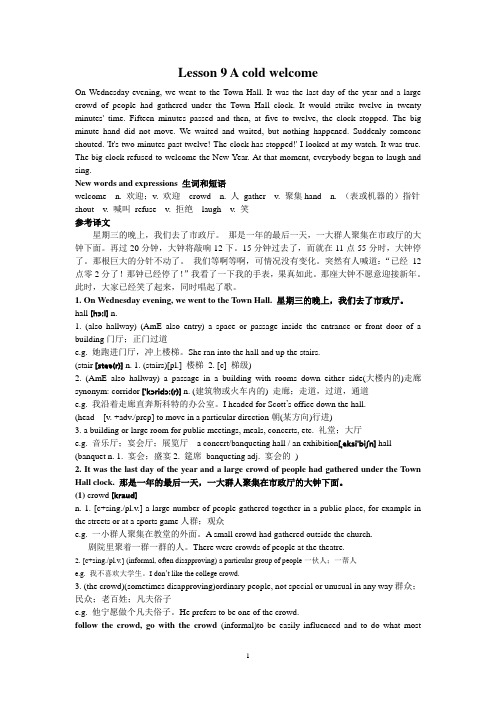
Lesson 9 A cold welcomeOn Wednesday evening, we went to the Town Hall. It was the last day of the year and a large crowd of people had gathered under the Town Hall clock. It would strike twelve in twenty minutes' time. Fifteen minutes passed and then, at five to twelve, the clock stopped. The big minute hand did not move. We waited and waited, but nothing happened. Suddenly someone shouted. 'It's two minutes past twelve! The clock has stopped!' I looked at my watch. It was true. The big clock refused to welcome the New Year. At that moment, everybody began to laugh and sing.New words and expressions 生词和短语welcome n. 欢迎;v. 欢迎crowd n. 人gather v. 聚集hand n. (表或机器的)指针shout v. 喊叫refuse v. 拒绝laugh v. 笑参考译文星期三的晚上,我们去了市政厅。
那是一年的最后一天,一大群人聚集在市政厅的大钟下面。
再过20分钟,大钟将敲响12下。
15分钟过去了,而就在11点55分时,大钟停了。
那根巨大的分针不动了。
- 1、下载文档前请自行甄别文档内容的完整性,平台不提供额外的编辑、内容补充、找答案等附加服务。
- 2、"仅部分预览"的文档,不可在线预览部分如存在完整性等问题,可反馈申请退款(可完整预览的文档不适用该条件!)。
- 3、如文档侵犯您的权益,请联系客服反馈,我们会尽快为您处理(人工客服工作时间:9:00-18:30)。
新概念英语第二册第9课习题答案
Lesson 10
1. a
根据课文第3行It has belonged to our family for a long time. 只有 a. has been in the family for a long time 是准确的,其他3个选择都不符合课文内容。
2. d
根据课文中第5-6行She struck the keys too hard and two of the strings were broken, 只有d. She hit the keys too hard 最
符合课文内容。
A. She played jazz on it 是事实,但是不能具体
说明钢琴损坏的原因;b. she played it 更不能说明钢琴损坏的原因;
c. She cut the strings 与事实不符合。
3. d
本句需要选同前面句子中的is kept 相对应的主动语态形式。
a. kept 是过去式,
b. have kept 是现在完成时形式,
c. are keeping 是现在实行时,这3个选择都在时态上与is kept 不符合。
只有d. keep 是一般现在时形式,与is kept时态一致,所以选d.
4. c
本句需要选名词的所有格形式。
a. families 是复数形式,而不
是所有格形式;b. families’是所有格形式,但不应该是复数;d. familys’写法错误;只有 c. family’s 是所有格形式,最符合标准。
5. b
a. since c. from d. by 都不能用来引导表示一段时间的短语,都不能用在many years 前,只有
b. for 能够引导表示一段时间的短语,所以选b.
6. c
这个问句的回答是Grandfather did, 是一般过去时,需要为疑问句选一个过去式的动词。
A. buy 是现在式;b. was bought 是过去式,但语态不对; d. did buy 用Who提问时不应该用助动词did; 只有c. bought 是过去式,最符合语法。
7. a
本句需要选一个能够进一步说明前面句子中的are not allowed to 的词。
B. mustn’t to 不合乎语法,must 后面不能有带to的动词不定式;c. haven’t to 不合乎语法,在意思上讲不通;d. don’t have to 虽然合乎语法,但意思不合乎题目意思。
Have to 是必须,不得不的意思,其否定形式是“不必”。
只有a.
mustn’t(不应该)最合乎语法,其意思也最符合题目意思。
8. c
a. told ,
b. said, d. spoken 都有“说,讲”的意思,都不符合题目意思,只有
c. called(称做,叫做)最合乎题目意思。
9. a
只有选a. 这个句子的意思才接近前一句的含义,而b. hold(握着),c. lift(提起),d. carry(拿着)都不合乎题目意思,所以选a.
10. c
要找出与前面句子中的damaged(损伤,损坏)意思相近的词。
a. hurt(伤害,使伤心)一般指精神上的,情感上的或指对身体某一部位的伤害,不是damage的同义词。
b. pained(使疼痛,使痛苦)也不是damage的同义词。
d. destroyed(毁坏,摧毁建筑物等)不是damage的同义词。
只有c. broke(打碎,损坏)同damage含义最接近。
11. c
该句需要找出与前面句子中的recently(最近)意义相同的词。
a. late(迟,晚)
b. lastly(最后)
d. finally(最终)
这3个都不是recently的同义词。
只有c. lately(最近)是recently的同义词
12. a
b. making(制造),
c. doing(做),
d. building(建造) 这3个选择都不合乎题目意思。
只有a. mending(修理)最符合题目意思。
因为clavichord 是“古钢琴”的意思,正在制造(making)这架古钢琴不太合乎逻辑。
更不应该说建造(building)这架古钢琴,而做(doing)这架古钢琴早意思上也讲不通,所以只能是正在修理(mending)这架古钢琴.。
